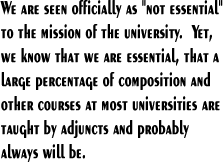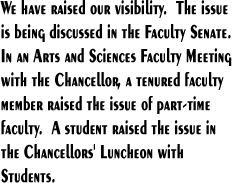1. Ever since I came back to
school as a "mature" student, I've
disliked the term "adjunct." I never
really thought about it or
asked myself why. When I became one
I instinctively used the
term "part-time faculty" rather than "adjunct"
to describe myself
to others and even to myself. Yesterday,
five years later, I
finally looked up the word "adjunct" in the
dictionary.
2. The first two definitions of the word "adjunct"
are: "a thing
added to something else, but secondary or
not essential to it; a
person connected with another as a helper
or subordinate
associate." The words of the first
definition expose, I think,
the root of the problem we face as adjunct
faculty and help
explain why practically all universities,
not just UMKC, view us
the way they do. We are seen officially
as "not essential" to
the mission of the university. Yet,
we know that we are
essential, that a large percentage of composition
and other
courses at most universities are taught by
adjuncts and probably
always will be. In other words there
is a legitimate need for
adjunct faculty.
3. The other term used to describe what I
do is "part-time." Now
this one we don't need to look up.
In the world of work it means
a less than 40 hour per week job. It
also implies, I would
argue, a certain lack of commitment.
For me, and most
"part-timers," it's also a misnomer.
I teach 15 hours a semester
at UMKC which is the most you can teach if
you are "part-time."
(A full-time non-tenure load in the English
Department is 12
hours per semester and a full-time tenure
load is 15 hours per
year.) Most of my teaching is in Composition.
I spend 14 hours
a week in the classroom, 6 hours per week
minimum in office hours
with students, 2-3 hours online, responding
to student ideas and revisions, and a minimum of 20 hours per week reading,
commenting on, and grading essays.
Each student in each of my
classes writes a minimum of 4 papers in a
series of drafts (each
of which I respond to) along with one shorter
reading response
paper per week. This comes to a minimum
of 42 hours per week.
This is not part-time work and my job is
not unique.
4. Some courses are taught by part-time instructors
because they
give students expertise needed in a particular
discipline that
cannot be supplied by the full-time faculty.
In some
departments, like English, there are simply
not enough full-time
faculty to cover the large number of courses
taught. Full-time
faculty teach a limited number of courses
in
order to have the
time to do research and administrative work.
Part-time faculty
are paid only to teach. This does not
mean that we don't do
research in our fields, publish, and volunteer
for administrative
tasks, committees, etc. We do all these
things, but we do them
voluntarily. They are not part of our
contracted responsibility
to the university, which is to teach.
Another reason for the use
of part-time faculty is to allow departments
to be flexible in
the number of courses offered in a given
semester. Without
part-time faculty, this would be virtually
impossible.
5. I have heard many people say that the "corporate
model" is to
blame for the current situation of part-time
faculty: a stipend
that barely exceeds minimum wage, no benefits,
virtually
worthless contracts, in many cases no offices
for student
conferences, no telephone, and, of course,
no computer. However,
adjuncts have been exploited at universities
long before the
recent trend to corporatization began.
In fact, I've often
wondered if we didn't provide the model.
In the last few years,
however, some corporations have begun to
see the economic value
of their part-time workforce and have started
paying them well,
giving them limited benefits, and viewing
them as permanent
employees, because permanent part-time employees
are more
productive than itinerant employees.
They know the job, they
know the market, they know what they're doing,
and they don't
need as much training. They are an
economic benefit to the
organization, just as we are. If, in
fact, universities are
following the corporate model, they should
do a bit more
research, since it is changing.
6. The organizing efforts of the part-time
faculty at University
of Missouri--Kansas City began last fall
when the adjunct faculty
of the English Department met and discussed
our situation. Our
"contracts" (and I use the word loosely)
state that we will be
paid $1800 to teach each 3-hour course and
that if a full-time
professor's course is cancelled, we will
be replaced, or words to
that effect. We receive no benefits
whatsoever no matter how
long we have taught continuously at UMKC
(in my case 8 years, in
some cases 20 years). We then drafted
a statement requesting
that:
6.1. our stipends be raised to a living wage
of $4,000 per 3-hour
course with an annual cost of living increase
(the Modern
Language Association recommendation
is $4500 per 3-hour course).
6.2. part-time faculty members be offered
9-month contracts after
one year of continuous service.
6.3. part-time faculty be allowed to negotiate
some participation
in a benefit package.
7. Our request was sent to the Chair of the
English Department,
who presented it at a Department Faculty
meeting, where it was
unanimously endorsed. He then forwarded
it to the Dean, where it
sat for the next four months.
8. After sending two more letters concerning
the lack of progress
on our requests, we invited as many of the
part-time faculty of
the university as we could find (not an easy
task) to a meeting,
where we formed the UMKC Part-Time Faculty
Association. The
officers of this association then met with
the Dean of Arts and
Sciences who expressed sympathy for our situation
and support for
our goals, but stated that the money was
not available in the A&S
budget. He suggested that we meet with
the Acting Provost. We
have been trying to meet with him since February
and are still
waiting.
9. We then sent a letter directly to the Chancellor.
In her
reply she stated that "part-time faculty
compensation cannot be
separated from that of the full-time faculty"
and that she is
"not willing to deal with the compensation
system for part-time
faculty separate from that for full-time
faculty." Her answer
suggests that our compensation has been linked
to that of
full-time faculty. If it had, we would
have received some sort
of an increase in the last seven years.
It is interesting to
note that UMKC paid part-time faculty $1100
per course in 1971
(30 years ago), when a part time faculty
member teaching 10
courses per year made roughly the same as
a beginning junior
faculty member. Such a ratio no longer
exists today, when there
is no link between full-time and part-time
salaries.
10. Our next step was to hold a two-day rally
called
"Presentation Days," in which part-time faculty
presented their
case to the students. It took place
in a quadrangle area that
serves the maximum number of students and
included posters,
speeches, music, and handouts. One
of the handouts urged
students to e-mail the Chancellor and gave
a sample format. The
rally was a success in that the students
were extremely
interested in our message and quite supportive,
and we received
television coverage on the evening news.
We have no way of
knowing how many e-mails the Chancellor received.
But we
received another letter from the Chancellor,
written on the
second day of the rally, reiterating what
she had already said
while adding that she believes "that part-time
faculty do a
fantastic job for UMKC" and that we are underpaid.
Her letter
ended with the admission that "I have received
many emails on
this subject. To the extent that you
have the capability to
convey this response to others, I would appreciate
it."
11. We have also urged our membership to attend
as many faculty
meetings as possible. UMKC is in the
midst of a new Blueprint
for the Future, a costly endeavor whose goal
is "to create the
possibility of an audacious new future for
UMKC. Its centerpiece
is a commitment to UMKC becoming a university
that is the
catalyst for transforming higher education."
We are endeavoring
to become part of the process, and to continue
to make ourselves
visible as a vital part of the university
community.
12. We haven't yet received a raise, benefits,
or meaningful
contracts, but there has been some movement.
13. We have raised our visibility. The
issue is being discussed
in the Faculty Senate. In an Arts and
Sciences Faculty Meeting
with the Chancellor, a tenured faculty member
raised the issue of
part-time faculty. A student raised
the issue in the
Chancellors' Luncheon with Students.
14. The Chancellor's responses have changed
somewhat. She is now
saying that the full-time faculty working
through the Deans must
decide the role and remuneration for part-time
faculty, a
strategy, in our view, to pit the full-time
faculty against the
part-timers. We have been told that
she will not meet with us,
since this is an issue for the Dean to decide.
She is not
however allocating any additional funding.
Therefore paying us
more would mean cutting somewhere else.
15. Our plans for the future are to continue
raising the issue
before the students, the faculty, the administration
and the
general public. This is a national
issue and we believe strongly
that ultimately we will win.
Mindy Fiala (fialam@umkc.edu)
is Lecturer in the Program in Adult
Continuing Education and in English, University
of Missouri,
Kansas City, and Secretary of the UMKC Part
Time Faculty
Association. Katie Kline (kmk190@umkc.edu)
is a Lecturer in
English UMKC and Treasurer of PTFA. |


|
![]()
